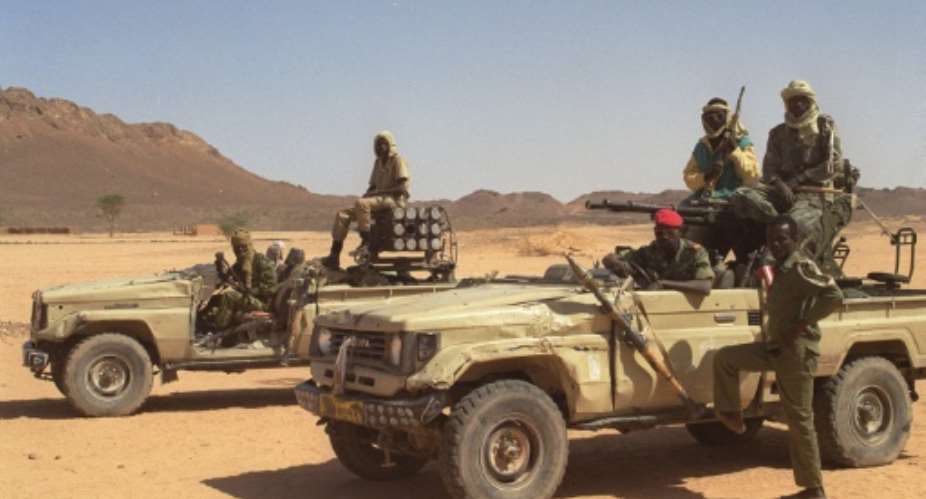Chad's Tibesti Mountains, where around 100 people have been killed in fighting between goldminers, is a lawless frontier region in the heart of the Sahara, where even water is part of a lucrative trade.
The rugged area, lying in Chad's far north near the Libyan border, is a source of ethnic friction and a bolthole for armed groups.
It has often fostered the revolts that have marked the country's history since independence from France in 1960.
"The Tibesti region is a bit like the Far West, a lawless zone -- there's a gold rush there and it's like in the films, and that leads to the use of military weapons," said Communications Minister Abderaman Koulamallah, reached by AFP in Libreville.
Violence broke out among miners on May 23 at Kouri Bougoudi near the Libyan border.
It was triggered by a "mundane dispute between two people which degenerated", Defence Minister General Daoud Yaya Brahim said on Monday.
"Around 100" people died and at least 40 were wounded, he said, adding that the clashes pitched Mauritanians against Libyans.
The authorities have decided to "suspend" all mining in the area, he said.
The discovery of gold in the Tibesti 10 years ago sparked a rush of miners from across Chad and neighbouring countries.
Many young Chadians from the country's deeply impoverished centre have headed there, often labouring in dangerous illegal mines.
Kouri Bougoudi, located more than 1,000 kilometres (600 miles) from the Chadian capital N'Djamena, is an exceptionally bleak place.
It lies in hilly, windswept desert and the diggers live in makeshift tents.
They depend on water trucked in by Libyan traders, as the nearest water hole is 200 kilometres (120 miles) away, said Koulamallah.
Brahim Edji, a researcher who comes from the region, said the miners were having to dig ever deeper to reach the gold, and were increasingly using "semi-industrialised machines, which degrade the environment".
"The business is not being regulated by the appropriate services," he said.
State void
"This is a remote mountainous area -- it's impossible for us to have 100-percent control over it," Koulamallah said, while Yaya Brahim acknowledged "the great majority (of mines in the area) are illegal."
Jerome Tubiana, a French specialist on Chad, said lawlessness in the area had been amplified by the porous Libyan border and the vast distance to N'Djamena.
"Libya has no state, and this absence is huge in the south of (Libya), whereas the Chadian state is largely absent in the north of (Chad)," he said.
 The gold-rich Tibesti Mountains lie in the forbidding central Sahara. By Patricio ARANA (AFP)
The gold-rich Tibesti Mountains lie in the forbidding central Sahara. By Patricio ARANA (AFP)
Chad's main armed rebel movement, the Front for Change and Concord in Chad (FACT), and a smaller group, the Military Command Council for the Salvation of the Republic (CCMSR), are both present in the region.
"You also find rebels and former rebels from Darfur" in Sudan, Tubiana said.
The impoverished Sahel state last year lost its 30-year ruler, Idriss Deby Itno, who was killed during an operation against FACT rebels.
His place was taken by his son, General Mahamat Idriss Deby Itno, at the head of a 15-member military junta.
In January 2019, several dozen people died in Kouri when fighting erupted between Libyan Arabs and people from the eastern Chadian region of Ouaddai.





 Whoever participated in the plunder of the state must be held accountable – Jane...
Whoever participated in the plunder of the state must be held accountable – Jane...
 A vote for John and Jane is a vote to pull Ghana from the precipice of destructi...
A vote for John and Jane is a vote to pull Ghana from the precipice of destructi...
 I’ll repay your abiding confidence with loyalty, understanding and a devotion to...
I’ll repay your abiding confidence with loyalty, understanding and a devotion to...
 ‘I’ve learnt deeply useful lessons for the future' — Serwaa Amihere breaks silen...
‘I’ve learnt deeply useful lessons for the future' — Serwaa Amihere breaks silen...
 I’m sorry for the embarrassment – Serwaa Amihere apologises for leaked sex video
I’m sorry for the embarrassment – Serwaa Amihere apologises for leaked sex video
 Dumsor: Matthew Opoku Prempeh not in charge of Energy sector – Minority
Dumsor: Matthew Opoku Prempeh not in charge of Energy sector – Minority
 Adu Boahen’s murder: Police arrest house help who was in possession of deceased’...
Adu Boahen’s murder: Police arrest house help who was in possession of deceased’...
 Akufo-Addo nominates Felicia Attipoe as Tema West MCE
Akufo-Addo nominates Felicia Attipoe as Tema West MCE
 Election 2024: I can't have someone I defeated twice as my successor – Akufo-Add...
Election 2024: I can't have someone I defeated twice as my successor – Akufo-Add...
